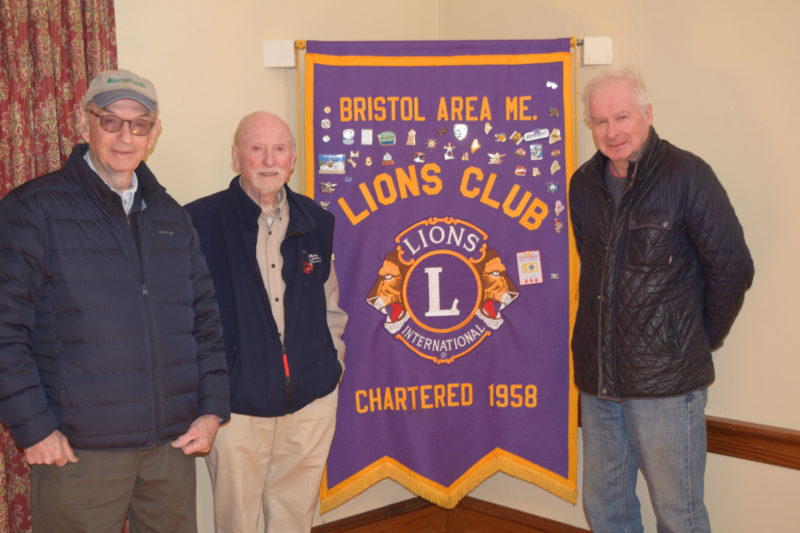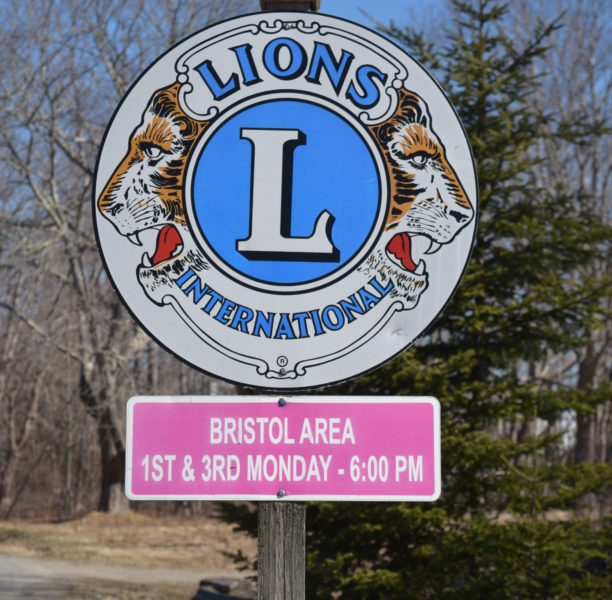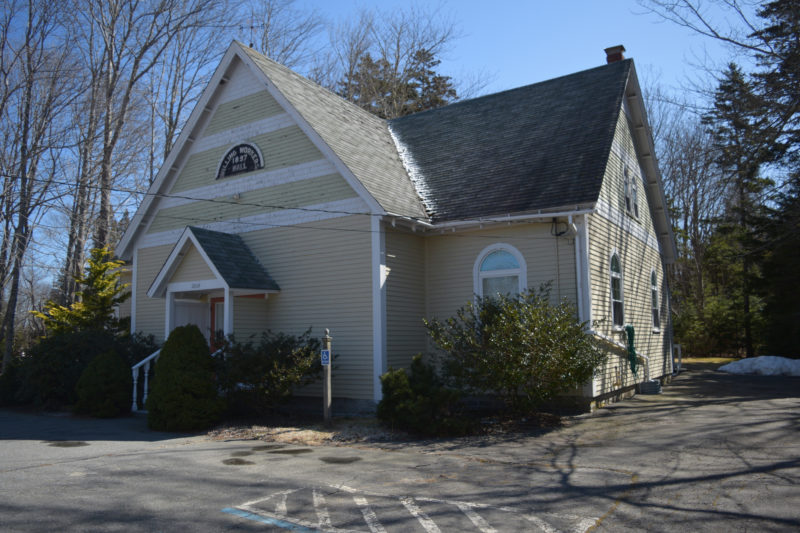
From left: Michael Hope, William Byrnes, and King Lion Brendan Donegan, three of the eight remaining active members of the Bristol Area Lions Club. Chartered in 1958, the Bristol Area Lions Club voted to dissolve last November due to declining membership. (Sherwood Olin photo)
Much like local groups including the Bristol Footlighters and the Willing Workers, the Bristol Area Lions Club will soon pass into their town’s storied history.
Bowing to the inevitable, the remaining members of the once-vibrant service organization voted to disband in November 2022. The months since have been devoted to ensuring a future for the club’s long-running scholarship program and disposing of the club’s remaining assets.
One of the last major pieces of business was settled when Bristol voters agreed to accept the donation of the club’s New Harbor home, the Willing Workers Hall, at the annual town meeting March 21.
According to Bristol King Lion Brendan Donegan, a few details remain before he submits a letter to the Lions Club International formally disbanding the local chapter.
“We are in the process of disbanding,” Donegan said. “But before we do that we turned over our scholarship funds to the Old Bristol Historical Society and just recently the town accepted the gift of our building. Once we get that process done, then we’re pretty much disbanded.”
For the last of the Bristol Lions, the decision to close was sad but pragmatic. Founded in October 1958, the Bristol chapter boasted more than 50 active members at its peak in the 1970s, according to club Treasurer Micheal Hope. It closes with 13 members on its rolls, of whom eight regularly participate in club activities.
Bristol Lions Parliamentarian William Byrnes said the club is a victim of the times. The spirit of community service and volunteerism that once powered groups like the Lions has dissipated.
In its later years the Bristol Lions were led by civic-minded community leaders like Pat Harrison, John Janell, Albert Rottner, and Al Sears, all of whom have passed on.
“They were so much a part of the community,” Byrnes said. “Some of them moved here and some of them having been here forever … This is just an observation, but people are not joining anymore. I have even talked to Rotaries, other Lions Clubs. We are not in a joining culture, I don’t believe.”
According to Donegan, the effort to keep the Bristol club going is hampered both by its location at the end of a peninsula and its small size. At one time the club welcomed guest speakers like state and county officials, scientists, educators, and artists to its monthly dinner meetings. Politicians used to eagerly accept opportunities to address the club.
More recently, it’s been hard to justify inviting a guest speaker, putting the onus on the guest to take their time to prepare a presentation and drive to New Harbor to address maybe five people, Donegan said.
“What happens is your membership is shrinking, but to attract people, they need to see a vibrant club, so it’s kind of a catch-22,” Donegan said. “You need to have a certain threshold.”
“We were warned probably 10 years ago,” said Bristol Lions Treasurer Michael Hope. “New people would come in and look around and there would be so few of us.”

A sign for the Bristol Area Lions Club advertises meetings on the first and third Mondays of the month. According to Bristol King Lion Brendan Donegan, a few details remain to be finalized before the club formally disbands. (Sherwood Olin photo)
In the 21st century even as membership declined, remaining members stepped up to fill the void.
“Even though we shrunk a lot of guys really stepped up and did extra which is the only reason we were able to keep going,” Donegan said. “Five years ago we were critical, but we were able to continue for five years because people did so much extra,”
The Bristol Area Lions Club is unusual in that despite its small size, it had assets much larger clubs did not have, namely a healthy scholarship fund and its own facility, the Willing Workers Hall. The Willing Workers, descendents of the World War I-era Young Ladies Society, disbanded in 1998 and transferred their home base to the Lions for $1 in the early 2000s.
While the hall was in their possession the Lions replaced the windows, refinished the floor, added sound proofing, a sound system, a movie projector and screen, among other renovations. A recent formal appraisal valued the building between $200,000-$250,000.
Rather than sell it, the club offered it the town.
The other major piece of business remaining was finding a way to continuing the Lions’ scholarship program. Each year since 1985, the club has awarded scholarships to high school students from Bristol or South Bristol pursuing some form of higher education.
After consideration, the Lions agreed to transfer the funds and responsibility for the program to Old Bristol Historical Society. Going forward, the funds will be awarded as grants, funded by the Bristol Lions Legacy Fund, which will be managed by the historical society. As part of the arrangement, Hope will join the historical society’s finance committee.
Applications for 2023 grants are available for download on the historical society’s website at oldbristolhistoricalsociety.org. Completed applications must be received by Friday, March 31.
The Bristol Area Lions Club leaves behind a legacy community service, from the annual distribution of Christmas baskets, area beautification projects and organizing fundraisers and lending financial support to other community organizations like Community Housing Improvement Project and the Community Energy Fund of Lincoln County.
Donegan said the Lions’ emphasis on active service was a selling point and sometimes a barrier, occasionally discouraging prospective members. With good humor he recalled taking the Lions oath, administered to him 10 years ago by Sears.
“Al Sears was a real nice guy, no nonsense,” Donegan said, laughing at the memory. “He goes, ‘First of all I’m going to make it clear to you this is not a social club. This is a service organization.’ I said ‘you should have told me.’”

The Willing Workers Hall in New Harbor, most recently home for the Bristol Area Lions Club, is now Bristol town property following a vote at the annual town meeting March 21. In late 2022, the remaining members of the Bristol Lions agreed to offer the building to the town rather than sell it on the open market. (Sherwood Olin photo)



